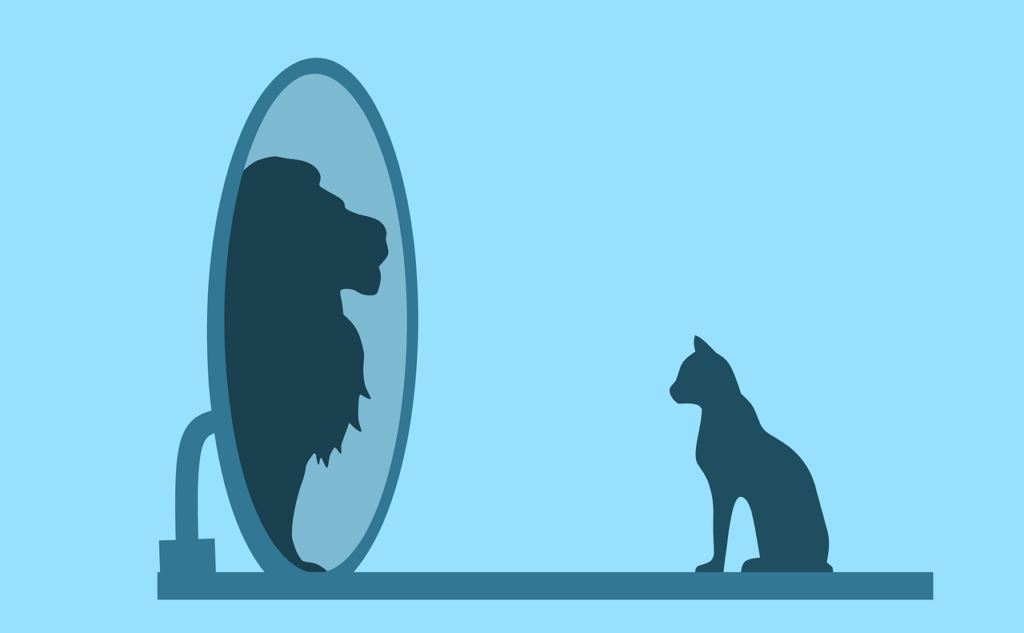Transcending the ego has become a trendy topic these days amid the many spiritual communities in the world. Supposedly, egolessness is the gateway to enlightened living – Get rid of that pesky ego and you’re on track for an incredible life.
If only it was that simple. Attempting to kill your ego leads to self-disintegration as it’s based on the idea that the ego is bad. But the ego isn’t bad – It’s neutral. It’s an essential part of the human experience, and without it, you wouldn’t last for very long.
The image that many people have of egolessness is that you’re a humble, connected, selfless person. This is a misconception. In truth, without an ego you would be a lifeless vegetable with no individual awareness.
Having an ego is written into the human contract, and for a good reason. We have egos because we’re not part of a hive mind. We’re not trees. We are individual beings who have a sense of self.
Although you need an ego, It is important to keep your ego in check and I’ll explain why in this article. Here we’re going to explore what exactly the ego is, how it works, and what you can do to find a much healthier relationship with it.
Understanding the ego

The ego is a mechanism that gives you an identity and sense of self. The ego is responsible for your individuality, which involves your belief systems, your perceptions, and your attitudes.
The ego is not a concrete, stable part of you as it’s always in a state of flux. When a person’s ego inflates – They experience a stronger sense of self-importance, often leading to self-centered behavior. When the ego deflates, the person’s sense of self-importance diminishes which usually leads to characteristics associated with selflessness. This process is called ego dissolution.
Generally speaking, a monk probably has a much smaller ego than a celebrity, but it doesn’t matter how enlightened an individual is. Every person has an ego – Without one you’d be a vegetable.
Can you kill your ego?
You have layers. Imagine your ego as the outer shell, while your soul is the yolk inside. The soul is your consciousness while the ego is the mind – And programs derived from the mind. Your soul is your authentic self while the ego is an aspect of the human program – Like the software required to operate a computer.
By recognizing when the ego speaks through your tongue and shows through your behaviors, you can take measures to put it in its place. The more you make a habit of keeping your ego on a leash, the more disciplined it will become.
It is possible to temporarily kill your ego, but you cannot permanently get rid of it because you need it. People may be able to experience a state of egolessness during particular spiritual experiences, especially via the use of plant medicines. I’ll link a couple of articles about that here if you want to go into more depth.
Common misconceptions about the ego
The ego has been given a bad rap. People tend to see the ego as a flaw as if it’s something we’re better off without. This has led to a lot of confusion because many people believe they need to kill their ego – and view it as the villain.
The ego is a part of who you are. Here are some common misconceptions to address about the ego:
- The ego is a barrier towards enlightenment: The ego is not a barrier, but an essential part of any human. Although some people may experience windows of ego death, they cannot stay there and sustain their minds and bodies.
- The ego is the source of suffering: Although the ego is a big cause of suffering, it would be naive to say it’s the only reason why people suffer.
- People can kill their ego: The ego can be temporarily removed, but people cannot walk, talk, think, and experience life as an individual without an ego
- Egolessness is associated with spiritual growth: Someone who has a small ego is likely to experience desirable characteristics such as humility, respect, and selflessness as they will see all things as equally important. But having too small of an ego can cause problems too.
- The ego is al bad: A big ego is generally not desirable, and not aligned with the higher self – Although it can be beneficial. People with big egos tend to be more confident, assertive, and value themselves more. The key is to find a balance where you value yourself, but don’t become self-absorbed.
The problem with a big ego

The ego isn’t a problem when you have a good relationship with it, but having a big ego can be a problem. As the ego is a source of disconnection, it’s also a source of suffering.
The ego acts as a separate organism that will fight for its life. That’s why it hurts so much when people make you feel small. You validate the ego by arguing back or proving a point. It feeds on recognition, by feeling superior to others in some regards.
The ego is deceiving as you’re coerced to believe your sense of happiness revolves around it. People get caught in this trap and believe that fulfillment comes through the service of the ego, which further disconnects them from their soul nature.
Many people believe that happiness comes from wealth, fame, possessions, and things, but that’s just the ego speaking. Genuine fulfillment is deeper than the ego. Your true self is the only source of genuine fulfillment, as it’s the part of you that’s connected to spirit.
Why is it important to find balance with the ego?
A big ego often leads to destructive characteristics such as:
- An exaggerated self-importance
- The belief that you’re more valuable than others
- Feelings of grandeur
- Arrogance
- Selfishness
- Self-centeredness
- Entitlement
- Egocentrism
- A lack of empathy and compassion
Killing your ego shouldn’t be the goal. Your goal should be to build a healthy relationship with your ego. You need to have some individuality in life. Otherwise, you would have no drive or ambition. You wouldn’t strive to achieve anything, or build an incredible life for yourself.
But the ego can get out of control if you don’t watch it. With a big ego, you might feel satisfied on the surface level, but it’s bringing you away from who you are.
Therefore it’s important to find a balance with your ego. This is to have some sense of personal identity and self-importance to help propel your life forward, but not too much where it turns toxic and causes more harm than good.
Identifying egocentric behavior
Egocentric people see themselves as the center of the world. Besides leading to a superficial sense of satisfaction rather than genuine fulfillment, egocentrism makes people value themselves more than everything else.
The ego craves recognition to reinforce its existence. It grows via recognition, approval, and validation. These become key factors in inflating the sense of me, by affirming its existence.
The ego doesn’t discern where the attachment is drawn from. People will identify with anything in an attempt to reinforce their existence, even if they’re attached to grief or trauma. The more pronounced your ego is, the more suffering you will face when you don’t get the recognition it craves. Like an addiction, it craves more to stay alive.
By boasting, bragging, and wanting to be the center of attention, it becomes easy to see the child inside throwing a tantrum – shouting “Acknowledge me!” That’s essentially what egocentrism is: A young child throwing a tantrum because they’re not getting the attention they need.
Avoiding ego inflation through possession
Possessions are also a source of identification. The more you own, the more you identify with. Your sense of self is reinforced by the things you have. It becomes your house, your job, your partner, your hobbies. The more you identify with, the stronger your sense of self becomes.
If something the ego is attached to is damaged, it hurts the ego too. Think about it this way. If someone loses their car that they pride themself on as opposed to someone losing their car that is just a way to get from A to B, who is going to suffer more?
The more that you identify with something, the harder it’s going to be to let it go. This is why modest people with less tend to have smaller egos. They have less to identify with and focus on what’s truly important in the absence of all these distractions.
Identification via labels
Labels reinforce your identity and position in this world. Getting sucked into labels becomes easy because the ego further refines its purpose. Labels come in the form of jobs, titles, positions, status, ethnicities, sexual orientation, and a lot more.
Here are some labels that people identify with:
- Your profession: A doctor, a lawyer, a police officer
- Authority: Leader, manager, influencer
- Demographic: Rich, poor
- Status: Celebrity, politician, entrepreneur
- Traits: Charismatic, funny, outgoing
- Ethnicity or color: Black, Jewish, Asian, Native
- Sexuality: Gay, Bi, Trans
- Lifestyle: Party animal, womanizer, vegan
- Religion and spiritual standing
- Political leaning
- Victim
- Disabled
- Addict
- Criminal
Change is the enemy of the ego because it thrives off stability. When you change yourself, for the better or worse, the ego loses its grip on who you are. It will fight to reinforce its existence because the ego likes certainty.
Finding balance with the ego

Let’s look at some things you can do to build a healthier relationship with it. Awareness is key if you want to put your ego in check because you need to catch it when it shows itself. See if you catch yourself doing anything on the list, and follow the measures to put it in its place.
Don't feed the egos!
How often do you see people glamouring up and creating a false image to earn admiration? How many women get Botox or boob jobs to feel more sexy? What about the guys who wear expensive jewelry and designer clothes while parading themselves in sleek cars to earn attention?
I’m not saying that you shouldn’t put your best self out there, or desire to look good. But I would challenge you, have you thought about why you go to such extents to be admired? Feed the soul, not the ego. Here’s how you can do that instead.
Stop fishing for validation
All that attention and external validation feels good because it makes you feel important. People are actually acknowledging that you’re doing good, which isn’t necessarily a bad thing. But when you start seeking out that acknowledgment, that’s when it becomes a slippery slope.
The main ways that people get validation are through compliments and credit. You can take credit for things you do if someone is giving it unprompted. But don’t look to get credit for the things you do. Just be proud of your work and allow other people to enjoy it. Don’t take credit for other people’s work.
I’m not saying it’s bad to get compliments but don’t go out looking for them, and be humble when you receive them. Social media is also a big source of validation these days. If you use it, just be conscious about why you’re using it, what you’re posting, and how much the results of the post matter to you.
Be humble
Speaking of being humble, avoid talking yourself up. Sometimes it’s tempting to do, sometimes we feel we need to. After all, how will people know how great you are if you don’t mention it? But if you truly feel great, people will recognize your greatness through your actions, it doesn’t need to be mentioned. If it’s necessary to mention, be modest.
Avoid boasting and bragging. Bragging about something is essentially screaming “I’m so insecure that I need someone to tell me how good I am as they coddle me to sleep!” Again, let your life speak for itself, you shouldn’t need to convince others that you’re winning.
What would he do?
Would he do it for me? Would they go out of their way to help me out? When you’re asked to do something or feel some sort of obligation to help someone out, do you think about what they would do in your position? Because if you do, you’re comparing. You’re not doing it out of kindness, but to balance the table.
Therefore, do things because you genuinely want to help people out. When you make this a practice and act from your heart rather than your mind, that’s when you’re going to see the value in helping others.
Don't use adjectives to describe yourself
I’m not sure if you’ve noticed, but I’m an extremely good writer. I like to use my unique humor to drive home points, and I’m super engaging! So what am I doing here, besides being an arrogant dick? I’m describing myself with adjectives which is a big no-no.
Do you ever do this unconsciously? Maybe you’re trying to emphasize a point or sell yourself. Really think about it because if you do, not only is it going to feed your ego, but it’s going to make you look stupid. People tend to emphasize how good they are at something to compensate for actually not feeling confident.
What do you have to prove?
I’ve noticed that I start emphasizing how good I’m doing in life when deep down I feel like I’m lacking. So my ego kicks in to point my attention away from a wound that needs to be healed.
When I had a very sad dating life, I talked about the tiny slithers of fulfillment I had any time I could, with anyone I could. Recently I started working at a restaurant, and I find myself talking about the many years of travel, or my side hustles that I’m working on.
Why? I have something to prove because I feel insignificant. Sometimes my ego kicks in to try and justify why I’m working a job that my ego perceives to be below me. Be careful when you’re trying to justify something, and maybe just allow people to not think so highly of you. What does their opinion of you matter anyway?
You don't need to be wrong right
Notice when you’re arguing a point across. The ego tends to get fired up to make sure that people know you’re right and they’re wrong. Have you ever thought that you can be right and still let others think that they are too? But how could your ego ever face being wrong? No, that would be despicable.
Likewise, if someone is blaming you for something that you didn’t do, just accept it. Of course, everything in moderation. It might not be wise to admit something that’s a serious deal, but if it’s something trivial, just take it on the chin even if you didn’t do it, and see how it makes you feel.
It's not all about you
Okay, you’re a person doing person stuff. I get that. But sometimes we make ourselves out to be the center of the world. We start drumming up minor issues to be life-or-death scenarios. But sometimes you just need to step back and have a look around you.
Especially when you’re getting caught in your head about the things happening in your life, take a step back. Reaffirm how insignificant you are in the scheme of things, and I mean that in the most liberating way possible.
Stop talking about yourself so much
How often do you use the word I or me? Do you find that you talk about yourself a lot, or somehow pull the conversation toward your life when it’s not about you? Don’t feel bad, it’s a natural tendency, we all do it. But having awareness of this allows you to catch those moments when you’re making something about yourself, which allows you to then stop it.
Don't be so materialistic
Your ego latches to everything that you have because it wants to identify. It wants to grow. It wants to thrive. And if you’re giving it fuel by constantly having more to identify with, it’s going to be harder to stay modest. It’s okay to have some things. Of course, you want to have a good life, and some things are essential. Just be cautious about how much you get, and how much you identify with.
Get off the socials!
There are a lot of positive aspects of social media, but there’s also a giant downside. Social media is designed to lure you in. It wants to feed your ego and make you feel good about yourself, because that’s how they get you to stay on. That’s why you keep coming back.
If you want to keep your ego in check, you should keep your social media usage in check. I’m not saying not to use it at all, but be conscious about when you use it, and why you use it.
Learn to take constructive criticism
A big ego will take constructive criticism as a personal attack. It will try to defend itself by believing it is perfect. It knows exactly what it’s doing. So if you find that you have an issue receiving constructive criticism, fight the urge to defend yourself and hear out what the other person has to say. You might actually gain some valuable insights as long as your ego doesn’t bark them away.
Moral superiority is not your friend
You identify with your beliefs which fuels your separation. And how much do you separate yourself from other people due to them? Sure, you can resonate with certain beliefs, there’s nothing wrong with that. But avoid taking a position of moral superiority.
Let’s look at some examples: Chances are you have taken a side. So I challenge you, can you discuss these topics openly? Can you understand other people’s point of view? Can you have a discussion with someone who disagrees with your beliefs? Here are some common rifts in today’s world. Be honest with yourself, how do you feel about the following?
- Do you have Liberal or Conservative views?
- Are you religious, spiritual, or an atheist?
- How do you feel about the Russia/Ukraine conflict?
- What’s your stance on the Israel/Palestine conflict?
- What are your thoughts on the COVID mandates vs anti-vax debate?
You may have a strong stance on one position, but do you judge those who don’t share your perspective? Can you see the human in everyone regardless of their beliefs? Can you see the validity of all perspectives without needing to combat them? Because if you can, chances are you’ve got a healthy relationship with your ego. If not, you have some work to do.
Start by jumping into the following article:


3 comments
Very good statement
Very helpful. Thank you. But you need to edit: your copy under the subhead “Bloating via attachment” simply repeats what is under the subhead “Avoiding ego inflation through possession.”
Thank you for pointing that out. I have now edited it. Glad you enjoyed the article!